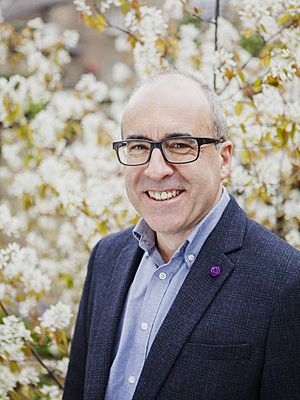Stephen Jackson (biologist) facts for kids
Quick facts for kids
Stephen Jackson
|
|
|---|---|
 |
|
| Born |
Stephen Philip Jackson
17 July 1962 Nottingham, England
|
| Alma mater | University of Leeds (BSc) Imperial College London (PhD) University of Edinburgh (PhD) |
| Known for | Understanding cellular responses to DNA damage and their relevance to cancer |
| Awards | EMBO member (1997) Fellow of the Royal Society (2008) FMedSci (2001) Buchanan Medal (2011) King Faisal International Prize (2016) Dr. A.H. Heineken Prize for Medicine (2016) Leopold Griffuel Prize (2019) |
| Scientific career | |
| Fields | Cancer DNA repair Cell biology Molecular biology |
| Institutions | University of Cambridge University of California, Berkeley University of Edinburgh |
| Thesis | Cloning and characterisation of the RNA8 gene of Saccharomyces cerevisiae (1987) |
| Doctoral advisor | Jean Beggs |
Sir Stephen Philip Jackson (born July 17, 1962) is a very important scientist who studies biology. He is known as the Frederick James Quick Professor of Biology. He works at the Cancer Research UK Cambridge Institute and the Gurdon Institute at the University of Cambridge. His main work involves understanding how our bodies fix damaged DNA. This research is super important because problems with DNA repair can lead to serious diseases like cancer.
Contents
Becoming a Scientist
Stephen Jackson started his journey in science at the University of Leeds. He earned his first degree in biochemistry in 1983. After that, he went on to get his PhD. He studied how yeast cells process RNA, which is like a messenger molecule in our cells. He did this research at both Imperial College London and University of Edinburgh, finishing his PhD in 1987.
Early Research Work
After getting his PhD, Stephen Jackson moved to the United States. He worked at the University of California, Berkeley. There, he became very interested in how genes are "turned on" or "turned off" in cells. This process is called gene transcription. In 1991, he came back to the UK. He became a group leader at what is now the Gurdon Institute.
Understanding DNA Repair
Sir Stephen Jackson's most important work has been about how our cells respond to DNA damage. Think of DNA as the instruction manual for our bodies. Sometimes, this manual can get damaged or have mistakes. Our cells have special ways to fix these mistakes. These repair processes are vital for life. If they don't work correctly, it can cause various diseases, especially cancer.
Discovering Repair Mechanisms
Jackson's team found out that an enzyme called DNA-PK (DNA-dependent protein kinase) gets activated when DNA breaks. These breaks are like big tears in our instruction manual. His lab then found and studied many parts of a system called NHEJ (non-homologous end joining). This system helps fix most of these big DNA breaks in human cells.
His work also showed how other important DNA repair factors work together. These include ATM and ATR, which are like alarm systems for DNA damage. They signal to the cell that there's a problem. Jackson's research also looked at how DNA repair is controlled during the cell's life cycle. He also studied how it works at the ends of chromosomes, called telomeres, and within chromatin, which is how DNA is packaged in cells.
Turning Discoveries into Medicine
Stephen Jackson didn't just want to understand how things work. He wanted to use his knowledge to help people.
KuDOS Pharmaceuticals
In 1997, he started a company called KuDOS Pharmaceuticals. The goal was to use what they learned about DNA repair to create new treatments for cancer. KuDOS developed special medicines that could stop certain DNA repair enzymes from working. One of their most successful medicines is called Olaparib (also known as Lynparza™). This medicine is now used worldwide to treat cancer. KuDOS grew into a big company and was later bought by AstraZeneca in 2005.
Other Companies
In 2011, Jackson started another company called MISSION Therapeutics. This company aims to develop drugs to help manage serious diseases, especially cancer. Later, in 2017, he founded Adrestia Therapeutics Ltd. He currently works there as the Chief Scientific Officer, leading their scientific research.
Awards and Recognition
Sir Stephen Jackson has received many important awards and honors for his amazing scientific work.
- In 1995, he received the Eppendorf-Nature European Young Investigator Award.
- He was given the Royal Society Buchanan Medal in 2011. This was for his "outstanding contributions to understanding DNA repair and DNA damage response signalling pathways."
- In 2016, he won the King Faisal International Prize for Science. This award recognized his work in linking DNA problems to cancer and finding ways to treat it.
- He also received the Dr A. H. Heineken Prize for Medicine in 2016. This was for his basic research on DNA repair and how he used that knowledge to create new cancer drugs.
- In 2019, he was awarded the Leopold Griffuel Prize for his work on DNA damage repair. This award also recognized his role in developing medicines like PARP1 and 2 inhibitors, which are used to treat cancer.
- In 2020, he received the Royal Society's Mullard Award. This was for his research that led to the discovery of Olaparib, a very successful drug for ovarian and breast cancers.
- In 2022, he received the Johann Anton Merck Award and the Cancer Research Horizon's Entrepreneurship Recognition Award.
- In 2023, he was made a knight by the King. This honor was for his great contributions to innovation and research.
He is also a member of important scientific groups. He became a member of the European Molecular Biology Organization (EMBO) in 1997. In 2001, he became a Fellow of the Academy of Medical Sciences. And in 2008, he became a Fellow of the Royal Society, which is a very high honor for scientists in the UK.
Images for kids


